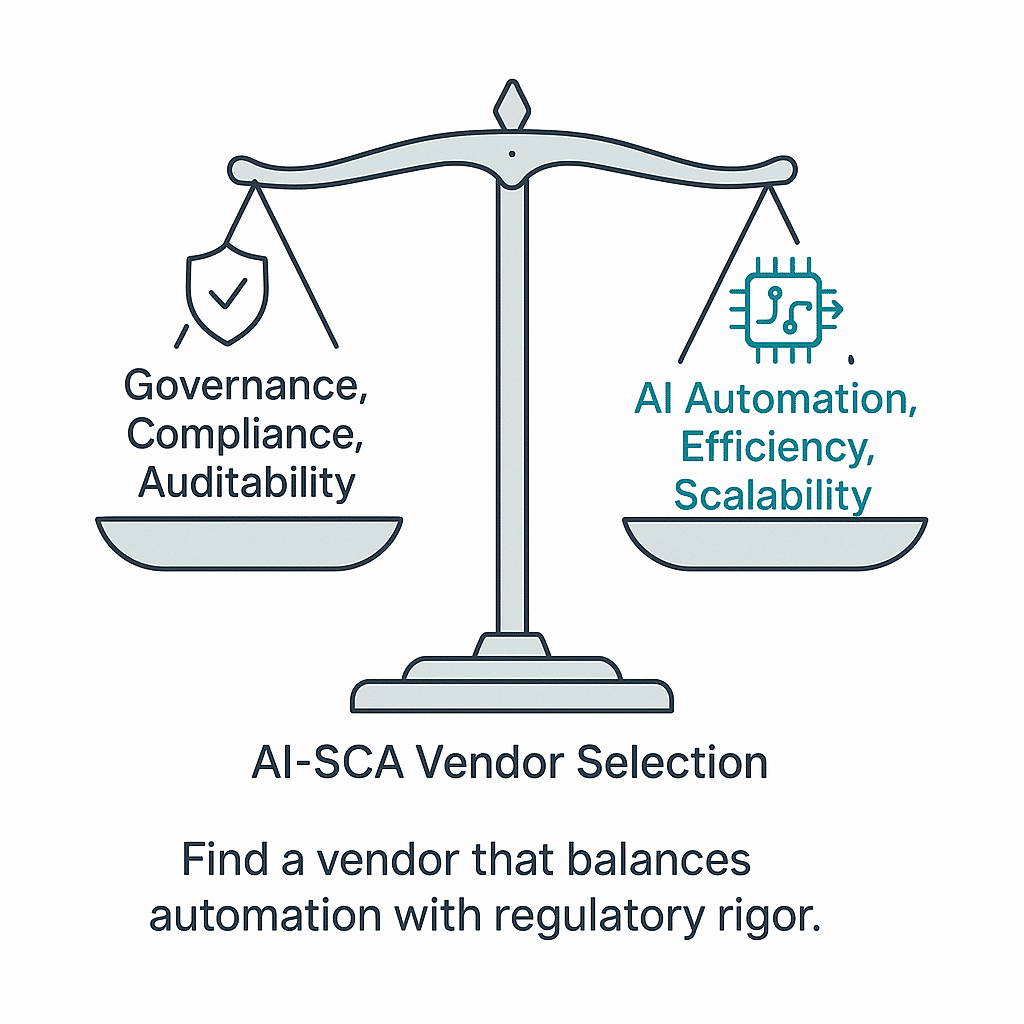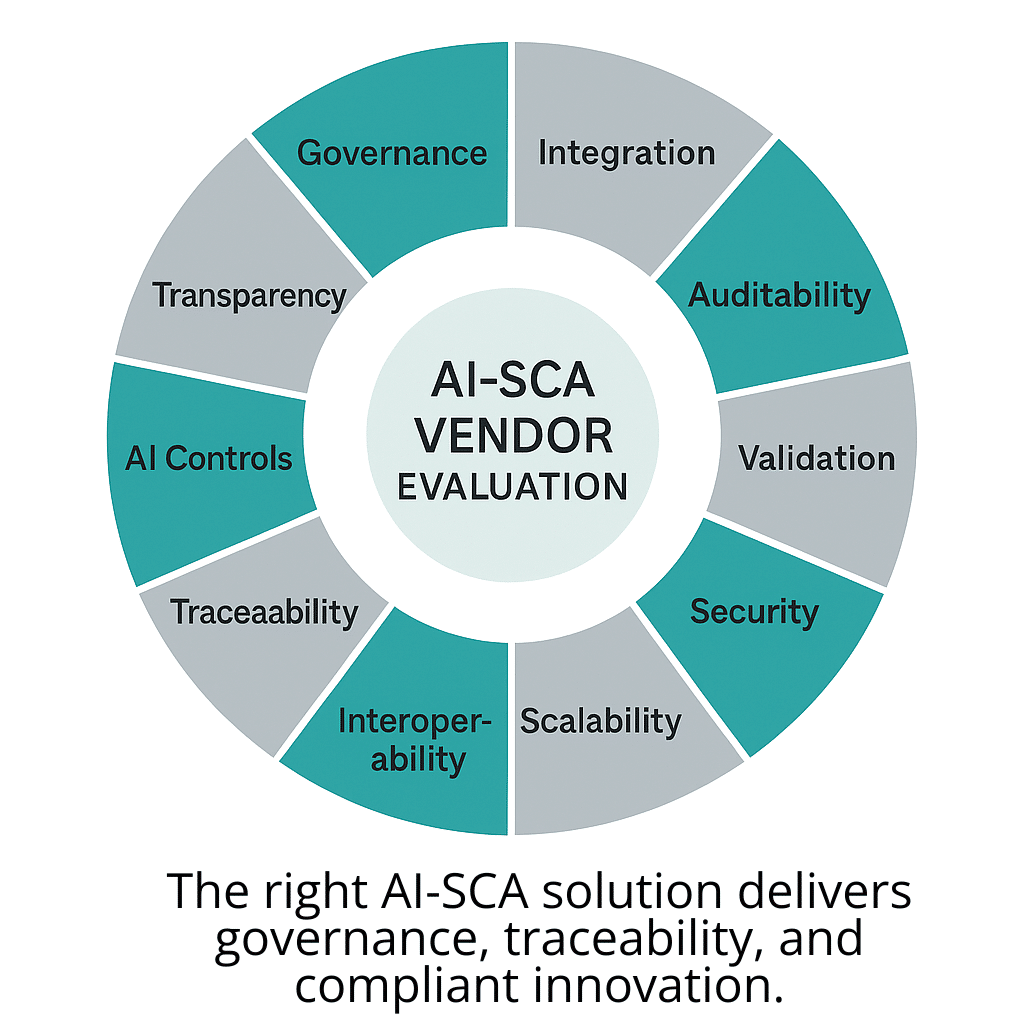Why Choosing the Right AI-SCA Vendor Matters

Structured content authoring (SCA) powered by artificial intelligence (AI) is rapidly becoming the foundation of modern pharmaceutical documentation. From regulatory submissions and clinical study reports to product labeling and patient-facing materials, content must now be accurate, consistent, and globally scalable—without adding complexity or workload.
But not all AI-SCA platforms are created equal.
Choosing the right vendor isn’t just an IT decision—it’s a long-term investment in how your teams collaborate, comply, and compete. The ideal platform should balance innovation with validation, offer flexibility without chaos, and support your current infrastructure while preparing you for the future of pharma documentation.
ROI increases significantly as more document types, brands, and teams adopt the structured approach.
To help guide your evaluation, here are 10 essential questions to ask when selecting an AI-powered SCA platform—and what the best vendors should be able to show you.
1. How Does the Platform Handle Modular Content Creation and Reuse?
Structured content hinges on modularity—breaking down documents into reusable content blocks such as indications, safety statements, or mechanism of action descriptions. These blocks can then be inserted into multiple documents, updated centrally, and reused across products, geographies, and regulatory bodies.
Ask vendors to demonstrate:
How content is created and stored as modules
How updates propagate across documents
How authors search, filter, and insert reusable blocks
Example: Updating a safety statement in one central block should automatically update that same content in 20 different labels across five markets—without manual editing.
2. Is Metadata a Core Foundation or a Bolt-On Feature?
Metadata—such as content type, product, geography, and approval status—is what makes modular content smart and discoverable. Without it, your structured content turns into a disorganized mess of digital fragments.
Strong platforms treat metadata as foundational, not optional.
Ask:
Can metadata be customized per organization, use case, or geography?
Is metadata required for content blocks?
Can AI leverage metadata to suggest content or flag inconsistencies?
Watch out for: Platforms that treat metadata as an afterthought or only support basic tagging. These will quickly buckle under the weight of scale.
3. How Transparent and Traceable Are the AI Capabilities?
AI is only as useful as it is explainable. In regulated industries, every suggestion, transformation, and automation step must be auditable and understandable to both internal reviewers and external regulators.
Look for platforms that include:
Clear audit trails of AI-generated suggestions
Role-based permissions for AI use and content approval
Configurable review and validation workflows
Real-world benefit: When an AI flags an inconsistency in product indication language across multiple documents, you should be able to trace the exact change history—and override or accept it with documented rationale.
4. Can the Platform Integrate with Our Existing Systems?

You shouldn’t have to overhaul your tech stack to implement SCA. Leading AI-SCA vendors offer open APIs, pre-built connectors, or native integrations with regulatory information management (RIM) systems, document management systems (DMS), and eCTD submission platforms.
Ask:
How does the platform integrate with systems like Veeva Vault, OpenText, or MasterControl?
Can we export structured content directly to submission templates or country-specific formats?
Tip: Seamless integration reduces duplication, ensures consistency, and accelerates submission timelines.
5. How Does the Platform Support GxP and Regulatory Requirements?
AI doesn’t get a free pass on compliance. In highly regulated environments, structured content platforms must meet GxP standards and be inspection-ready at all times.
Ask for proof of:
Validation documentation
Part 11 compliance
Change management protocols
Electronic signatures and audit logging
Checklist to request: Vendor’s Computer System Validation (CSV) documentation and sample inspection readiness reports.
6. What Document Types and Use Cases Are Supported Today?
While structured content is often associated with labeling, its applications go far beyond. The right vendor should support a range of document types and workflows—including medical writing, promotional review, patient communications, and submission-ready modules.
Ask for concrete examples such as:
Global Core Data Sheets (GCDS)
Investigator brochures
ePI packages
CTA cover letters
Watch for red flags: If a vendor only talks in generic terms like “flexible” or “configurable,” press for proof. Ask to see working examples from real implementations.
7. How Are Reuse and Impact Measured?
One of the most powerful benefits of structured content is the ability to reuse content blocks efficiently. But without strong tracking and reporting, you won’t know how much value you’re actually getting.
Ask:
Can we track how often a block is reused?
Can we measure the impact of a change to a reused block?
Are versioning and rollback capabilities built in?
Example: Changing the mechanism of action description in one block should show where it was reused and when those documents were last updated or approved.
8. How Is Content Governance Enforced in the Platform?
Structured content can only scale if it’s governed. Otherwise, modular content quickly becomes the new content chaos. Look for platforms that enable tight governance over who can create, edit, approve, and publish content—without slowing teams down.
Capabilities should include:
Role-based permissions
Custom workflows and approval routing
Business rules to ensure compliance
Governance in action: If an author tries to publish a block without required metadata or medical review, the system should block it and flag it for correction.
9. What Does the Implementation and Support Journey Look Like?
A powerful platform is only as good as your team’s ability to use it. Implementation should include robust onboarding, tailored training, and expert support—especially for pharma teams navigating change management, compliance, and cross-functional collaboration.
Ask about:
Project timelines and phases
Post-launch support models and SLAs
Access to onboarding materials and best practices
Pro tip: Look for vendors who offer proof-of-concept pilots, industry-specific templates, and content migration support to ease the transition.
10. What’s the Vendor’s Strategic Roadmap for Life Sciences?
You’re not just buying a platform—you’re choosing a partner. The ideal vendor should be actively investing in life sciences and evolving their roadmap to meet future regulatory changes and AI innovation.
Ask:
How are you preparing for ePI, IDMP, and CTD 4.0?
What AI capabilities are you planning to add?
How do you engage with pharma working groups or industry standards?
Why this matters: A vendor who understands the pharma landscape won’t just build for today—they’ll help you stay compliant and competitive tomorrow.
Choose for Tomorrow, Not Just Today
In an industry where speed, accuracy, and compliance are non-negotiable, the right AI-powered SCA vendor can be transformative. But choosing the wrong one could create more problems than it solves.
Use these 10 questions not just as a checklist—but as a framework to understand how each vendor thinks about your industry, your goals, and your long-term success. Ask for demos, documentation, and references. Test their roadmap and governance philosophy.
Because ultimately, the best AI-SCA vendor isn’t just the one who checks the most boxes—it’s the one who grows with you.